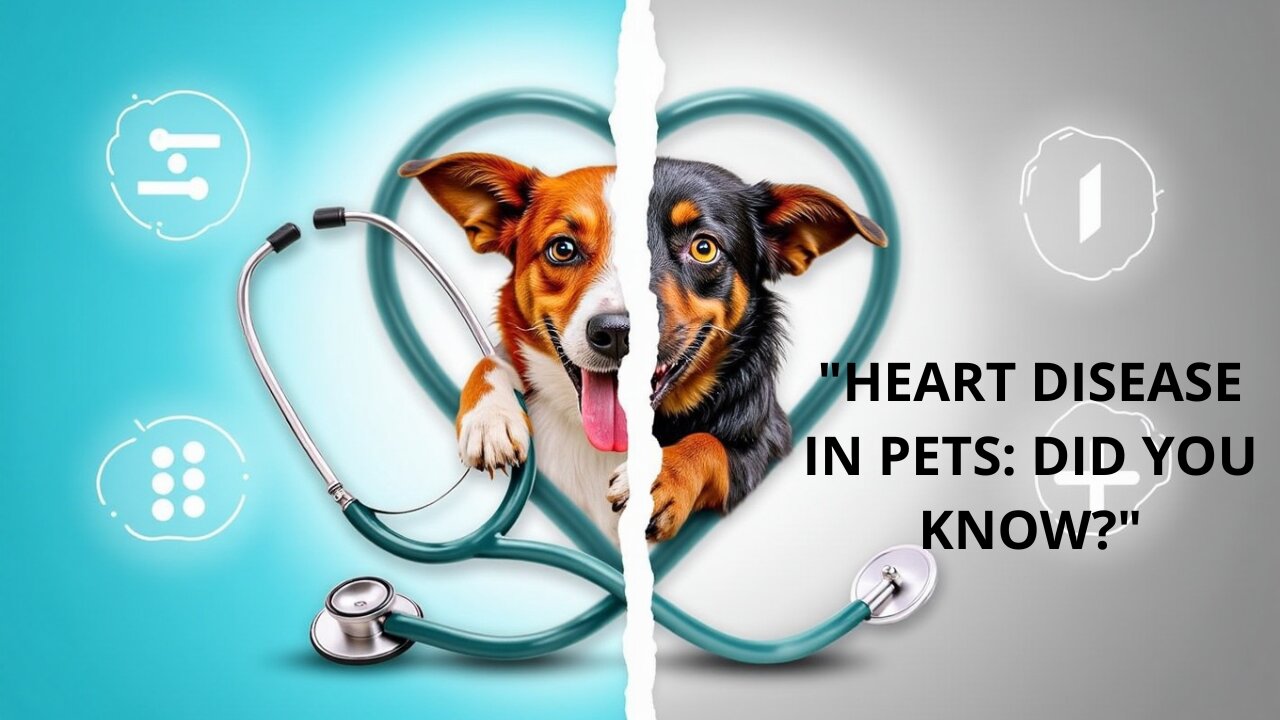Premium Only Content

Most Common Heart Diseases in Pets: What You Need to Know.
Most Common Heart Diseases in Pets: What You Need to Know.
Heart disease is a growing concern among pet owners, especially as our furry friends live longer thanks to advances in veterinary medicine. According to Dr. Rafael, a veterinary cardiologist with over 10 years of experience, heart conditions can range from mild to severe, and early diagnosis is essential to ensure the quality of life of animals. Congestive Heart Failure (CHF) CHF is one of the most common conditions, especially in older dogs. It occurs when the heart cannot pump blood efficiently, resulting in fluid accumulation in the lungs or abdomen. Signs include: Persistent coughing; Easy fatigue; Rapid or labored breathing; Abdominal bloating. Dr. Rafael highlights that breeds such as Poodles, Dachshunds and Cavalier King Charles Spaniels are more predisposed to this condition. Degenerative Valve Disease (DVD) Common in small dogs, such as Chihuahuas and Shih Tzus, DVD is caused by the wear and tear of the heart valves over time, making it difficult for them to close properly and allowing blood to backflow. Symptoms usually come on slowly and include coughing, fatigue, and exercise intolerance. Dilated Cardiomyopathy (DCM) DCM is more common in large dogs, such as Dobermans and Boxers. This disease affects the heart muscle, making it weaker and less able to pump blood. Symptoms include lethargy, fainting, and difficulty breathing. High Blood Pressure Common in cats, especially those with kidney disease or hyperthyroidism, high blood pressure can lead to secondary problems, such as retinal detachment, blindness, or heart damage. "It is essential to measure the blood pressure of older cats during routine exams," warns Dr. Rafael. Hypertrophic Cardiomyopathy (HCM) HCM is the most prevalent heart disease in cats. In this condition, the heart muscle thickens, making it difficult to pump blood. Breeds such as Maine Coon and Ragdoll are genetically predisposed. Symptoms include panting, loss of appetite, and lethargy. Prevention and Diagnosis According to Dr. Rafael, early diagnosis is essential to controlling these conditions and ensuring a long, healthy life for pets. Some tips include: Performing regular check-ups, especially in older or genetically predisposed animals; being aware of changes in behavior, such as excessive tiredness or difficulty breathing; maintaining a balanced diet and avoiding being overweight, which can put a strain on the heart. Treatment Treatment varies depending on the condition and severity. It may include medications, dietary changes, and, in some cases, more invasive procedures. “Today, we have very effective medications that significantly improve the quality of life of animals with heart disease,” explains Dr. Rafael. Advances in veterinary medicine have allowed us to better understand heart disease in pets, its causes, and how to treat it most effectively. The heart, just like in humans, is a vital organ in animals, and heart problems can seriously compromise their quality of life if not treated properly. Let's delve deeper into some aspects that are rarely mentioned about these conditions. Causes and Risk Factors Heart disease can be caused by genetic factors, aging, inadequate diet, obesity, and even infections. Some bacterial or parasitic infections, such as dirofilariasis (heartworm), can cause significant damage to the heart and blood vessels. This condition, transmitted by mosquitoes, is more common in hot and humid areas. In addition, a sedentary lifestyle is also a factor that contributes to the worsening of cardiovascular health in pets. "Animals that are not encouraged to exercise regularly have a greater chance of developing heart problems throughout their lives," explains Dr. Rafael Mendes. Importance of the Electrocardiogram Exam Many owners are unaware of this, but exams such as the electrocardiogram (ECG) are essential for assessing the health of pets' hearts. This simple test measures the electrical activity of the heart and can detect cardiac arrhythmias or other irregularities that may go unnoticed during a routine physical exam. Nutritional Monitoring A proper diet plays an essential role in the prevention and management of heart disease. Low-sodium foods are recommended for pets with heart failure because they help reduce fluid retention. Supplements such as omega-3 fatty acids have also been shown to benefit heart health. Dr. Rafael stresses the importance of consulting a veterinary nutritionist to ensure that the feeding plan is aligned with the specific needs of the animal. "Avoid offering human food scraps or excessive treats. These habits can contribute to weight gain and, consequently, overload the heart", he reinforces. Impact of Stress on Heart Health Stress is an often overlooked factor in pet health, but it can have a significant impact, especially in animals predisposed to heart problems. Situations such as changes in the environment, excessive noise or lack of social interaction can trigger symptoms of anxiety, negatively affecting the cardiovascular system. Practices such as environmental enrichment and interactive activities can help keep the pet mentally healthy, reducing the risks associated with stress. Importance of Preventive Treatment Dr. Rafael emphasizes that, in many cases, prevention is the best medicine. He recommends that dog and cat owners have annual checkups even when the animals appear healthy. "Tests such as echocardiograms, blood tests and chest x-rays are powerful tools to identify problems before they become critical." The Connection Between Age and Heart Health As pets age, their hearts tend to lose some of their efficiency. However, this does not mean that all older animals will develop heart problems. A routine that includes a balanced diet, moderate exercise, and regular check-ups can ensure that your pet's heart remains healthy for a long time. Advances in Treatments In recent years, treatments for heart disease in pets have evolved significantly. Modern medications, combined with minimally invasive techniques, such as heart valve repair through catheterization, are now available in specialized clinics. “Access to these advances allows many animals to live years with quality, even after being diagnosed with serious diseases,” says the specialist. Caring for your pet's heart goes beyond meeting basic needs. It involves attention, dedication, and regular monitoring by qualified professionals. Dr. Rafael Mendes reinforces: "Heart health is a reflection of comprehensive care for the animal. The more informed pet owners are, the better the chances of detecting and treating any problems in time." Protecting your pet's heart is more than an act of love; it's a commitment to their longevity and well-being. Subscribe to our channel and activate the bell so you don't miss incredible tips, curiosities and essential information to ensure the well-being of your best friend!
-
 4:09:30
4:09:30
StevieTLIVE
6 hours agoWarzone Wins w/ FL Mullet Man
38.5K1 -
 1:04:01
1:04:01
BonginoReport
10 hours agoLefties Wish Death on Trump but He’s BACK! - Nightly Scroll w/ Hayley Caronia (Ep.125)
194K83 -
 3:18:28
3:18:28
Tundra Tactical
7 hours ago $3.50 earnedWe Survived the Military… But Not This Basement
38.3K -
 20:12
20:12
Clownfish TV
14 hours agoDisney Needs MEN Back?! They ADMIT Star Wars and Marvel are DEAD!
30.4K41 -
 1:37:00
1:37:00
Anthony Rogers
14 hours agoEpisode 381 - Tim Kelleher
20.5K1 -
 1:01:42
1:01:42
The Nick DiPaolo Show Channel
11 hours agoTDS Hits New Level! | The Nick Di Paolo Show #1786
56.4K41 -
 1:02:27
1:02:27
Michael Franzese
9 hours agoFace to Face with a Former Chinatown Gangster Turned NYPD Detective
54.1K13 -
 1:31:25
1:31:25
The Confessionals
14 hours agoThe Queen of Heaven Exposed (Hathor, Lilith & Ancient Gods Return)
35.6K8 -
 13:09:26
13:09:26
LFA TV
20 hours agoLFA TV ALL DAY STREAM - TUESDAY 9/2/25
201K14 -
 3:17:57
3:17:57
LIVE WITH CHRIS'WORLD
12 hours agoLIVE WITH CHRIS'WORLD - IT WORKED IN D.C. & IT WILL WORK IN CHICAGO
20.8K6